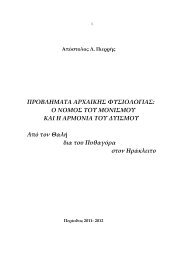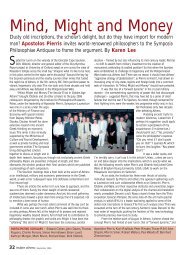APPENDIX C΄ ON DEPILATION: BODY COSMETICS IN CLASSICAL ...
APPENDIX C΄ ON DEPILATION: BODY COSMETICS IN CLASSICAL ...
APPENDIX C΄ ON DEPILATION: BODY COSMETICS IN CLASSICAL ...
Create successful ePaper yourself
Turn your PDF publications into a flip-book with our unique Google optimized e-Paper software.
<strong>ON</strong> DEPILATI<strong>ON</strong>: <strong>BODY</strong> <strong>COSMETICS</strong> <strong>IN</strong> <strong>CLASSICAL</strong> ANTIQUITY 567<br />
(àÓ‰ÚáÓ ·s ̤Á’ ôÚÈÛÙÔ˜ öËÓ TÂÏ·ÌÒÓÈÔ˜ Aú·˜, / ùÊÚ’ \A¯ÈÏÏÂf˜<br />
Ì‹ÓÈÂÓ, he was the best at the time when Achilles kept aloof from the<br />
war because of his ÌÉÓȘ, Iliad, B, 768 says Homer in answer to the<br />
question (v. 761): Ù›˜ Ù’ iÚ ÙáÓ ù¯’ ôÚÈÛÙÔ˜ öËÓ, Û‡ ÌÔÈ öÓÓÂappleÂ,<br />
MÔÜÛ·, etc.), this man is described by Homer as tall of stature, broadshouldened,<br />
with perfect bodily development; when Priam asks Helen<br />
(Iliad, Γ, 255 sqq.):<br />
she answers:<br />
Ù›˜ Ù’ ôÚ’ ‰’ ôÏÏÔ˜ \A¯·Èe˜ àÓcÚ Ëû˜ Ù ̤Á·˜ ÙÂ,<br />
öÍÔ¯Ô˜ \AÚÁ›ˆÓ ÎÂÊ·Ï‹Ó Ù ηd ÂéÚ¤·˜ üÌÔ˘˜;<br />
ÔyÙÔ˜ ‰’ Aú·˜ âÛÙd appleÂÏÒÚÈÔ˜, ≤ÚÎÔ˜ \A¯·ÈáÓ.<br />
(cf. on the subject of Ajax large body Pausanias, I, 35, 5; Philostratus,<br />
Heroica, I, 2). He was also surpassingly beautiful, inferior to none<br />
again but Achilles; Iliad, P, 279-80:<br />
Aú·˜, n˜ appleÂÚd ÌbÓ Âr‰Ô˜, appleÂÚd ‰’ öÚÁ· Ù¤Ù˘ÎÙÔ<br />
ÙáÓ ôÏÏˆÓ ¢·Ó·áÓ ÌÂÙ’ à̇ÌÔÓ· ËϽˆÓ·.<br />
(repeated in Odyssey, λ, 549-50; to which passage Eustathius, 1698,<br />
45 sqq., comments: Á¤ÁÚ·appleÙ·È ÛÎfiÏÈÔÓ apple·Ï·ÈfiÓ, Û‡ÌʈÓÔÓ ÙÔÖ˜<br />
ÙÔÜ appleÔÈËÙÔÜ, Ùe «apple·Ö Ù TÂÏ·ÌáÓÔ˜ Aú·˜ ·å¯ÌËÙ¿, ϤÁÔ˘Û› Û’ â˜<br />
TÚÔÖ·Ó ôÚÈÛÙÔÓ âÏıÂÖÓ ¢·Ó·áÓ Î·d \A¯ÈÏϤ·». ˘ÏÏ·ÏÂÖ ‰b Ùˇá ÙÔÈ-<br />
Ô‡Ùˇˆ ÏfiÁˇˆ ηd ì \IÏÈ¿˜). Odyssey ω, 17-8 makes it explicit that his<br />
excellence pertained both to face and body:<br />
Aú·ÓÙfi˜ ı’, n˜ ôÚÈÛÙÔÓ öËÓ Âr‰fi˜ ÙÂ, ‰¤Ì·˜ ÙÂ,<br />
ÙáÓ ôÏÏˆÓ ¢·Ó·áÓ, ÌÂÙ’ à̇ÌÔÓ· ËÏ›ˆÓ·.<br />
This then Ajax had ¯Úfi· Ï¢ÎfiÓ (Iliad Λ, 573) which must have been<br />
an eminent characteristic of his, for Hector refers to it when<br />
addressing him in Iliad, N, 824 sqq.: ¯Úfi· ÏÂÈÚÈfiÂÓÙ· (v. 830).<br />
Eustathius (p. 863.32) mentions as a variant ¯·ÏÎfiÓ for the Ï¢ÎfiÓ of<br />
the former passage, which may be another instance of the already<br />
noticed tendency to correct all offensive instances of Ï¢ÎfiÓ which do










